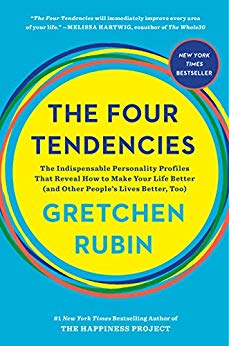

This article is an excerpt from the Shortform summary of "The Four Tendencies" by Gretchen Rubin. Shortform has the world's best summaries of books you should be reading.
Like this article? Sign up for a free trial here .
What is the Upholder tendency from Gretchen Rubin’s Four Tendencies like? How do they behave, and what’s the Upholder Personality?
Out of the four tendencies, Upholders may have the biggest advantages in life. They have many strengths, including the ability to rely on themselves and to be relied on by others, they’re motivated, self-starters, and organized. However, they do struggle when it comes to delegating work and can often be uptight and impatient.
Keep reading to learn all about Upholders.
Overview of the Upholder Tendency
Upholders readily respond to both external and internal expectations. They think expectations, in general, are important, and enjoy fulfilling both their own and others’. They find it easy to take action and follow-through, and have no problem forming habits. They like schedules, routines, and rules. They dislike making mistakes or letting themselves or others down.
If their boss asks them to stay late to finish a project and they know it’s important, they’ll stay (fulfilling external expectations); but if their boss last-minute asks them to stay late to finish a project and the Upholder has a lecture that evening that they signed up for months ago and are excited about, they’ll most likely go to the lecture, and work on the project later (fulfilling internal expectations).
Strengths of Upholders
People with the upholder tendency can rely on themselves, and others can rely on them. They’re independent and self-mastered: they meet deadlines, keep appointments, fulfill commitments, manage tasks.
According to Gretchen Rubin, Upholders follow rules, but break them for ethical reasons based on their own inner sense of justice. Expectations don’t make them feel pressured or trapped—Upholders feel free, creative, and productive when they have expectations placed on them. They don’t need others to supervise or motivate them.
They rarely feel resentful about what they have to do, nor do they get burnt out easily—this is because they can easily fulfill their internal expectations, so they don’t feel they’re just doing things for other people all the time. Upholders enjoy fulfilling expectations for others but won’t agree to do something they don’t want to and don’t need to do, which helps them avoid resentment. They balance doing what others need them to do with doing what they need to do for themselves, which prevents burnout.
People with the upholder tendency can do well in the following careers: business owners, consultants, freelancers, or coaches—anything where they’re in charge or have to do work on their own.
Some other positive ways to describe Upholders:
- Self-starters
- Motivated
- Conscientious
- Reliable
- Thorough
- Stick to schedules
- Want to understand and meet expectations
Weaknesses of Upholders
Upholders sometimes follow the rules even when it’s better not to. Rubin (an Upholder herself) recalls waiting at a boat taxi stand that was clearly non-functioning because someone told her that’s the taxi stand she should wait at, when a taxi stand a few yards up the river was active. No matter how many boats she saw at the other stand, Rubin continued to wait at the defunct stand.
All the tendencies assume everyone else functions like they do, and people with the upholder tendency are no exception. However, because Upholders are so capable, their assumption that everyone is as capable in the exact same ways sometimes gets them in trouble. They can be disdainful, impatient, or rude when others don’t respond to expectations the same way they do.
They also avoid holding others accountable because they don’t have any sympathy for people who can’t meet expectations. They don’t like pressuring others because they don’t think they should have to—they think everyone should be able to respond to expectations the way they do. People with the upholder tendency have a lot to gain from learning about the other tendencies: they’ll save themselves a lot of annoyance by understanding how others function
According to Gretchen Rubin, Upholders have trouble delegating tasks because they get disappointed with other people’s results. Therefore, they’d rather just do the tasks themselves, which can cause them to take on more workload than really necessary.
Upholders aren’t very adaptable and don’t deal well with changes or last-minute adjustments. They keep their routines and like set schedules, and believe that if something last-minute comes up, it’s because someone else didn’t plan well enough. Last-minute changes interfere with Upholders because they either create new external expectations to add to their list, or they conflict with existing external or internal expectations that the Upholder has already committed to.
People with the upholder tendency can get defensive if someone, like a Questioner, challenges why they do things. They do things because people expect them to, or because they expect themselves to. This is enough for an Upholder to take action.
Upholders will find it challenging to work in aggressive or overly creative fields, environments with continuously changing circumstances, or environments where rule-breaking is a positive trait.
- Law school might seem attractive to Upholders because it’s a busy environment that requires excellent self-mastery. But if they get hired at a firm that aggressively challenges tax laws, the Upholder may struggle with justifying why the tax laws should be challenged.
- (Shortform example: Upholders may also struggle in creative or volatile fields like marketing, where creatives need to be able to find new ways of campaigning, and projects can fall through for no reason at all. This uncertainty and lack of routine can be difficult for an Upholder)
Some other negative ways to describe Upholders:
- Rigid
- Struggle to adapt
- Defensive
- Uptight and humorless
- Impatient with others
- Demanding
- Too by-the-book
Self-Preservation
According to Gretchen Rubin, Upholders are good self-preservationists, for the most part. They take care of themselves and, because internal expectations are important to them, do the things they find enjoyable. They make time for both work and play.
Fulfilling their internal expectations protects them from experiencing resentment or burnout with external expectations. People with the upholder tendency enjoy fulfilling expectations for others but won’t agree to do something they don’t want to and don’t need to do, which helps them avoid resentment. They balance doing what others need them to do with doing what they need to do for themselves, which prevents burnout. They want other people to take care of themselves the same way; in fact, they often expect others to take care of themselves the same way.
In fact, they’ll generally ignore others’ expectations if they’re in conflict with their own.
- Rubin cites a personal anecdote of a friend who had everyone over for dinner. At a certain point in the evening, he stood up, announced he was tired and wanted to go to bed, and kicked everyone out. Some people were shocked or offended; Rubin’s an Upholder herself, so she understood perfectly.
Their self-preservation means they generally have good habits. Habits are about mastering yourself, and as we know, Upholders have high levels of self-mastery. It’s generally letting themselves off the hook that makes them feel bad—they feel best when they’re fulfilling expectations.
Tightening
However, where other people can start off strong with a good habit and then fall off the wagon, Upholders sometimes do the opposite. They’ll start a good habit and slowly, over time, become more and more rigid about the habit and less willing to give it up. Rubin calls this tightening.
———End of Preview———

Like what you just read? Read the rest of the world's best summary of Gretchen Rubin's "The Four Tendencies" at Shortform . Learn the book's critical concepts in 20 minutes or less .
Here's what you'll find in our full Four Tendencies summary :
- What the Four Tendencies are, in complete detail
- How to compensate for your tendency's weakness
- Which tendency you pair best with romantically
- How to deal with other people's tendencies






